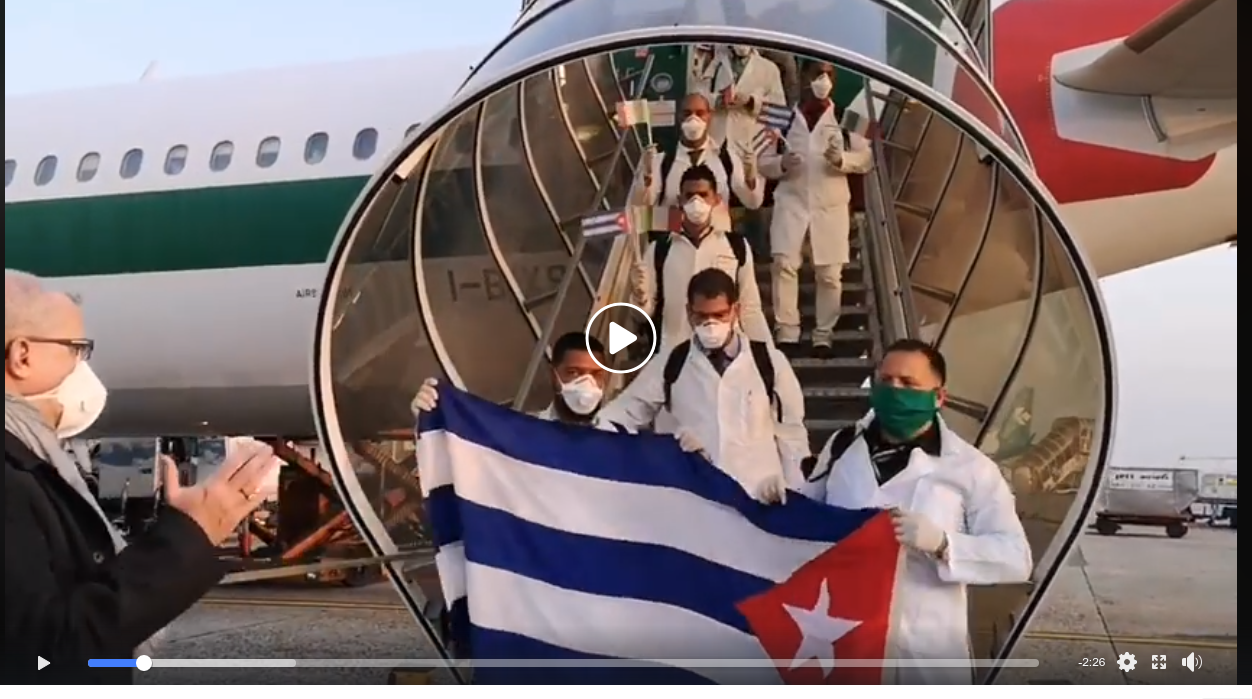|
Get AfricaFocus Bulletin by e-mail!
Format for print or mobile
USA/Global: Let Cuba Live!
AfricaFocus Bulletin
July 27, 2021 (2021-07-27)
(Reposted from sources cited below)
Editor's Note
The Biden administration has now been in office for six months,
along with a narrow Democratic majority in Congress. So it seems an
appropriate time for a report card. I offered my evaluation in another AfricaFocus Bulletin sent out today, entitled “Building Back Better? Or Not?” But as I was finalizing that Bulletin, I realized that the rising U.S. attacks on Cuba are a key indicator of how things are going.
They show that the United States is headed toward “Build Back Worse”
– a sharp bipartisan reversion to simplistic Cold War policies and
the “bad neighbor” policy toward Caribbean countries. And yet the
“mainstream media” (for me, the daily Washington Post and New York
Times) contained at best only a few hints of dissent from this
policy consensus.
I began accumulating links on the Cuba situation to include in the
Bulletin, and they grew beyond the space available there. Hence the
need for a separate treatment. This Bulletin contains an open letter
published in the New York Times on Friday, July 25, as well as
excerpts and links to sources that provide a fuller picture.
For previous AfricaFocus Bulletins on USA/Africa relations, visit
http://www.africafocus.org/country/usa-africa.php
++++++++++++++++++++++++++++++++++++++++++++++++++
|
Open Letter to President Biden
Let Cuba Live!
Sign the letter here.
Dear President Joe Biden,
It is time to take a new path forward in U.S.-Cuban relations. We,
the undersigned, are making this urgent, public appeal to you to
reject the cruel policies put into place by the Trump White House
that have created so much suffering among the Cuban people.
Cuba – a country of eleven million people – is living through a
difficult crisis due to the growing scarcity of food and medicine.
Recent protests have drawn the world’s attention to this. While the
Covid-19 pandemic has proven challenging for all countries, it has
been even more so for a small island under the heavy weight of an
economic embargo.
We find it unconscionable, especially during a pandemic, to
intentionally block remittances and Cuba’s use of global financial
institutions, given that access to dollars is necessary for the
importation of food and medicine.
As the pandemic struck the island, its people – and their government
– lost billions in revenue from international tourism that would
normally go to their public health care system, food distribution
and economic relief.
During the pandemic, Donald Trump’s administration tightened the
embargo, pushed aside the Obama opening, and put in place 243
“coercive measures” that have intentionally throttled life on the
island and created more suffering.
The prohibition on remittances and the end of direct commercial
flights between the U.S. and Cuba are impediments to the wellbeing
of a majority of Cuban families.
“We stand with the Cuban people,” you wrote on July 12. If that is
the case, we ask you to immediately sign an executive order and
annul Trump’s 243 “coercive measures.”
There is no reason to maintain the Cold War politics that required
the U.S. to treat Cuba as an existential enemy rather than a
neighbor. Instead of maintaining the path set by Trump in his
efforts to undo President Obama’s opening to Cuba, we call on you to
move forward. Resume the opening and begin the process of ending the
embargo. Ending the severe shortages in food and medicine must be
the top priority.
On 23 June, most of the member states of the United Nations voted to
ask the U.S. to end the embargo. For the past 30 years this has been
the consistent position of a majority of member states. In addition,
seven UN Special Rapporteurs wrote a letter to the U.S. government
in April 2020 regarding the sanctions on Cuba. “In the pandemic
emergency,” they wrote, “the lack of will of the U.S. government to
suspend sanctions may lead to a higher risk of suffering in Cuba.”
We ask you to end the Trump “coercive measures” and return to the
Obama opening or, even better, begin the process of ending the
embargo and fully normalizing relations between the United States
and Cuba.
Signatories available at https://www.letcubalive.com/.
*******************************************************************
Books by Piero Gleijeses
For anyone wanting to understand the role of Cuba in African
liberation struggles, and the parallel U.S. opposition to those
struggles, the case study of Angola is essential.
These two books, by Johns Hopkins School of Advanced International Studies professor Piero Gleijeses, are the
key scholarly works on this history, based on multiple archival and
oral sources from the United States, Cuba, Angola, and other
countries.
See his CV here.

https://bookshop.org/a/709/9780807854648

https://bookshop.org/a/709/9781469628325
|
Other Background Resources on US/Cuba Policy
Whether simply out of political calculation or a return to the worst
of U.S. Cold War thinking, the Biden administration, with political
support from both parties, is doubling down on destructive policies
against the Cuban people. Yes, Cuba does need reform, and uncritical
support of the Cuban government disregards current realities.
But U.S. sanctions, aimed at punishing the Cuban people as a means to bring down the government, build on a history of U.S. occupation of Cuba at the beginning of the 20th century, imposing a highly limited “independence” after defeating Spain in the Spanish American War. Shortly after Cuban revolutionaries overthrew the latest U.S.-dependent government in 1959, hostility between the United States and Cuba mounted rapidly, culminating in the failed invasion at the Bay of Pigs in 1961 and economic sanctions in 1962, almost 60 years ago. Sanctions were somewhat relaxed during the Obama administration, then strengthened again under Trump.
In Cuba policy, therefore, President Biden is continuing the Trump
policies and even threatening to escalate. This is not “building
back better” but doubling down on the worst. No rethinking of past
policies at all!
https://www.democracynow.org/2021/7/27/cuba_protests_pandemic_conditions
https://novaramedia.com/2021/07/20/whats-actually-going-on-in-cuba/ by Helen Yaffe.
An excellent summary by a leading Cuba expert based at the University of Glasgow. Author of the book We Are Cuba! on the post-Soviet history of Cuba.
See also https://www.facebook.com/helen.yaffe.9/ and https://www.facebook.com/100007628650696/videos/pcb.2929945513936375/498584691215357
Yaffe is in Cuba now, and her Facebook page contains videos such as those at the second link above.
https://responsiblestatecraft.org/2021/07/19/ending-forever-wars-must-include-economic-warfare/ - by Assal Rad
“In a rare tweet on foreign policy, President Biden stated, “We stand with the Cuban people,” and cited their “economic suffering.” The irony was not lost on many commentators who observed that only weeks earlier the United States rejected — for the 29th consecutive year — a United Nation’s resolution to end the decades-long U.S. embargo on Cuba that has cost the small-island nation an estimated $144 billion and hampered its ability to combat the pandemic. As the international community overwhelmingly voted to end the embargo in a vote of 184 to 2, only Israel joined the U.S. in support of continuing the now 60-year embargo. “
Philip Brenner, one of the leading U.S. experts on Cuba, based at American University in Washington, DC, has been quoted extensively in the Spanish newspaper El Diario, as well as in the Spanish-language edition of the Los Angeles Times, but apparently not yet in English-language media included in Google News.
https://thegrio.com/2021/07/19/will-protests-lead-to-lasting-change-in-cuba/
A clear explainer in a 10-minute video with Dr. Danielle Clealand, University of Texas (Austin). Not the final word, but very useful. I am told by friends who know Cuba very well that her 2017 book on The Power of Race in Cuba is excellent.
https://thegrio.com/2021/07/22/black-americans-haiti-cuba-opinion/ - by Blue Telusma,
“As a woman of Haitian and Cuban lineage living in the United States, this subject hits home in a very personal way. ”
https://www.thenation.com/article/world/cuba-airstrikes/ - by Aída Chávez, July 20, 2021
The threat of U.S. military intervention.
https://www.thedailybeast.com/its-time-for-biden-to-choose-between-starving-cubans-and-votes-in-florida by William LeoGrande, July 15, 2021
|
And back in March 2020, a dream that it might be better rather than worse
https://www.organizingupgrade.com/can-coronavirus-be-a-catalyst-for-thinking-globally/
- by William Minter and Imani Countess, March 25, 2020
“Don't Be Afraid to Dream
To challenge a new Democratic administration and inspire progressive mobilization, we should advance not only practical policy goals but also new visions of mutual cooperation beyond those presently thinkable. One clear albeit difficult example is the case of Cuba, where U.S. policy has been paralyzed for decades by right-wing pressures.
A progressive agenda for U.S.-Cuban relations should begin with the reversal of new restrictive measures imposed by the Trump administration and progress toward full elimination of the trade embargo and travel restrictions that have defined U.S. policy for almost six decades.
A more ambitious goal would be to stress U.S. collaboration with Cuba in promoting global health, as happened in the case of Ebola in West Africa. The United States should be prepared to accept future Cuban offers of assistance with disaster relief and preparedness, an offer that the George W. Bush administration rejected in 2005 after Hurricane Katrina. Most visionary, but also beneficial to both countries, would be for the United States to ask Cuba for technical assistance in developing equitable public health policies in this country—and to pay generously for such assistance. That could promote mutual understanding as well as begin to pay for repairing the damage done over many decades of U.S. intervention in Cuba.”
https://democracynow.cachefly.net/democracynow/360/dn2020-0324.mp4?start=2547.0&end=3237.0
https://www.democracynow.org/2020/3/24/cuba_medical_diplomacy_italy_coronavirus
https://www.aljazeera.com/videos/2020/3/22/cuban-doctors-head-to-italy-to-fight-coronavirus
https://www.washingtonpost.com/video/world/cuban-doctors-nurses-arrive-in-italy-to-combat-coronavirus-outbreak/2020/03/23/22e75e15-9a16-4d5c-8cf7-e33b2d635407_video.html

AfricaFocus Bulletin is an independent electronic publication
providing reposted commentary and analysis on African issues, with
a particular focus on U.S. and international policies. AfricaFocus
Bulletin is edited by William Minter. For an archive of previous Bulletins,
see http://www.africafocus.org,
Current links to books on AfricaFocus go to the non-profit bookshop.org, which supports independent bookshores and also provides commissions to affiliates such as AfricaFocus.
AfricaFocus Bulletin can be reached at africafocus@igc.org. Please
write to this address to suggest material for inclusion. For more
information about reposted material, please contact directly the
original source mentioned. To subscribe to receive future bulletins by email,
click here.
|
